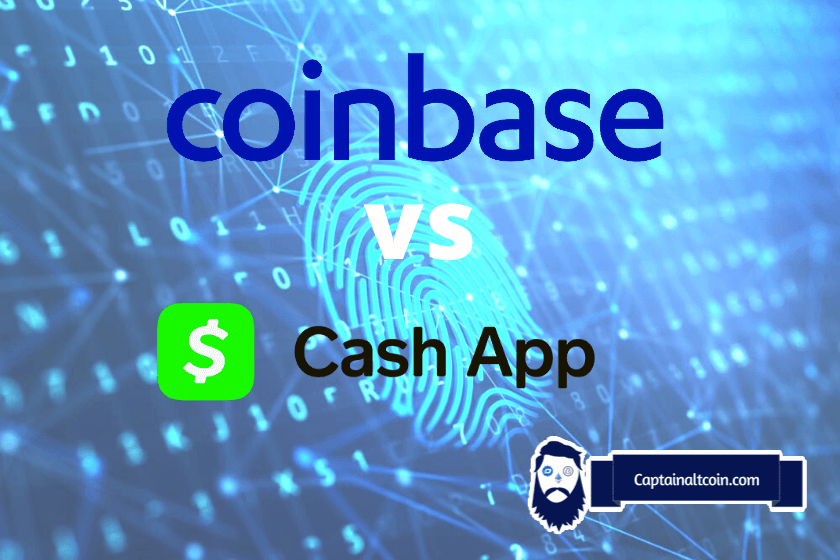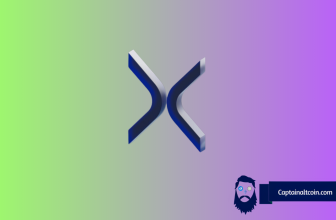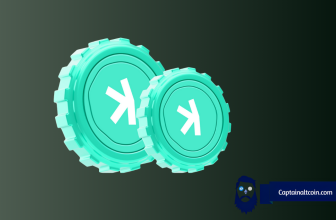
In the dynamic world of cryptocurrency exchanges, Coinbase and Cash App have emerged as two major players, each offering unique features and services. If you’re considering buying Bitcoin or other cryptocurrencies, it’s essential to understand the differences between these platforms.
Ever since Cash App, owned by Square which is backed by one of the most famous Bitcoin backers and CEO of Twitter, Jack Dorsey, announced they will support the purchase of Bitcoin through their app, Coinbase had to step up its game as the playing field got much more serious.
Especially since Cash App is marketed as a commission-free place for buying Bitcoin (they did charge a spread and earn money that way), Coinbase lost a solid chunk of the pie to the Square-owned app.
However, later on, Cash App changed its fee structure to be more transparent about the fees they charge and they are still not available in all US states, which saw Coinbase remain at the top of the food chain in the world of crypto exchanges.
Still, this duel is worth a deeper look and analysis, which is exactly what we will do here. So, let’s get the Coinbase vs Cash App comparison rolling.
| Platform | Information |
|---|---|
| 💼 Coinbase | – Launched in 2012 in San Francisco, California. – Complies with U.S. laws and regulations. – Charges around 3.99% for credit/debit card purchases and 1.49% for bank transfer purchases. – Supports various cryptocurrencies. – Offers multiple payment methods. – Customer support through email. – Enjoy an excellent reputation and trust. – Segregates customer funds from company operational funds. – 98% of customer funds stored in secure offline cold storage. |
| 💲 Cash App | – Peer-to-peer payment app formerly known as Square Cash. – Allows easy sending and receiving money. – Offers Bitcoin purchases. – Charges no fees for standard bank deposits. – Supports limited countries. – Provides payment services and a free debit card. – Security measures include PIN entry, Touch ID, encryption, and more. |
What you'll learn 👉
Coinbase vs Cash App: General info
Coinbase was launched in 2012 in San Francisco, California. As a company operating in the United States, Coinbase is required to comply with U.S. laws and regulations, including state money transmission laws and regulations, the USA Patriot Act, the Bank Secrecy Act, and is registered with FinCEN as a Money Services Business. These laws and regulations force accountability onto Coinbase. This is something that may be lacking from some of their offshore competitors in other countries with less strict regulations. It is widely considered as one of the best crypto exchanges in the market.
Cash App is a peer-to-peer payment app formerly known as Square Cash. The app enables easy sending and receiving money. Customers can link the app to an existing bank account, or spend money directly from Cash App with a dedicated debit card. Since January 2018, their customers can buy bitcoin through the app.
Cash App vs Coinbase: Fees
Coinbase charges around 3.99% for credit/debit card purchases and 1.49% for bank transfer purchases.
| Purchase Method | Coinbase Fees |
| U.S. Bank Account | 1.49% ($0.15 minimum) |
| Coinbase Wallet (U.S. Dollars) | 1.49% |
| Credit Card or Debit Card | 3.99% |
As for the Cash App Bitcoin fees 2021, there are no fees if you choose to deposit money from your bank via their standard deposit method. If you choose instant, you pay a premium of 1.5% in fees.
- Sending and Receiving Money: Free for personal use (2.75% fee for receiving business payments)
- Withdrawal Fees: Free (for standard withdrawals) or 1.5% (for instant withdrawals)
- Credit Card Fees: 3%
Buy and Sell Bitcoin: Square Cash App is now charging a 1.75 percent fee for bitcoin transactions, whether buying or selling. There are two kinds of fees that the app will be charging. First is a service fee for each transaction. And second is a “volatility fee” that is based on price fluctuations across exchanges in the United States.
Cash app bitcoin fees vs Coinbase fees are lower, which means it is cheaper to buy bitcoin and crypto on Cash app.
Buying Limits
Coinbase does not clearly define limits for new users on their site. Instead, limits can vary depending on your country, account verification, buying history, and account age. To apply for higher limits you will have to verify your identity. Once you do, a fully verified US resident can transaction up to $50,000 per week, while verified customers from the EU may have a maximum of $30,000 in their account at any time. You can check their limits through your account.
Cash App lets you send up to $250 within any 7-day period and receive up to $1,000 within any 30-day period. You can increase these limits by verifying your identity using your full name, date of birth, and the last 4 digits of your SSN.
You can purchase and deposit up to $10,000 worth of bitcoin in any 7-day period while Bitcoin withdrawal limits are $2,000/day & $5,000/week.
Supported Countries
Coinbase serves customers in the following countries:
Australia, Austria, Belgium, Bulgaria, Canada, Croatia, Cyprus, Czech Republic, Denmark, Finland, Greece, Hungary, Ireland, Italy, Jersey, Latvia, Liechtenstein, Malta, Monaco, Netherlands, Norway, Poland, Portugal, San Marino, Singapore, Slovakia, Slovenia, Spain, Sweden, Switzerland, United Kingdom, and the United States.
Cash App is not available for the international community and works only in the US, Canada and UK.
Supported coins
Currently, coins listed on its non-Pro interface include Bitcoin, Bitcoin Cash, Ethereum, Ethereum Classic, USD Coin, XRP, Stellar, Zcash, 0x, Litecoin, and the Basic Attention Token.
You can buy only Bitcoin via Cash App.
Deposit and Withdrawal methods
Coinbase offers 3 payment methods: Debit card, bank account, or wire transfer.
As for withdrawal methods – you have one additional way to get your money from Coinbase by using PayPal.
Bitcoin or Bank transfer – The Square Cash App integrates with all major banks, letting you transfer money directly to and from your bank account. You can choose a standard deposit or withdrawal, which is free and takes up to three days, or charge an extra fee of 1.5% for an instant deposit or withdrawal.
Customer Support
Coinbase customer support is handled through email, and in our personal experiences, we’ve typically received responses from support within 24-72 hours. They also have an extensive FAQ for general questions.
You can communicate with their customer support through the app (tap your profile, then scroll down and tap Cash Support). The Cash App is not really famous for its stellar customer support. Many users complain about getting their accounts disabled for no apparent reason with no customer support help to sort out the issue.
Trust and reputation
Coinbase enjoys an excellent reputation and trust as a registered and regulated company with well-known VCs as investors, a transparent team, and an immaculate track record (with minor, anecdotal complaints from individual customers).
Coinbase is a Bitcoin company based in San Francisco, which means that is required to comply with US laws and regulations, at both a federal and state level. Here are some of the regulatory bodies, laws, and regulations that Coinbase complies with:
- It complies with state money transmission laws and regulations.
- It complies with the USA Patriot Act.
- It complies with the Bank Secrecy Act.
- It is registered with FinCEN as a Money Services Business.
Cash App is licensed under state money transmitter licenses.
When they use services like ACH, they are governed by the institutions that have supervisory, rule-writing, and enforcement provisions surrounding the relevant laws. This would primarily include the Electronic Funds Transfer Act. EFTA is covered by the Consumer Financial Protection Bureau and the Federal Trade Commission.
Security
Coinbase segregates customer funds from company operational funds. These customer funds are held in custodial bank accounts. This means they will not use your funds of yours to operate their business. They also claim, “Even if Coinbase were to become insolvent, the funds held in the custodial bank accounts could not be claimed by Coinbase or its creditors. The Funds held in those accounts would be returnable to Coinbase’s customers.”
98% of customers’ cryptocurrency funds are stored in secure offline cold storage. These cryptocurrencies are held on multiple hardware wallets and paper wallets. The physical cryptocurrency wallets are then stored in vaults and safety deposit boxes around the world. These measures protect customers’ funds from being lost or stolen by hackers.
The remaining portion of cryptocurrency, that is stored online, is fully insured by a syndicate of Lloyd’s of London.
Cash app is very secure as they use cutting-edge security measures to prevent data or funds loss. Some of the measures include Security Locks – PIN entry, Touch ID, or Face ID verification protects payments. Encryption – PCI-DSS level 1 certification means they protect all your data. Coin Storage – Your Bitcoin balance is securely stored in their offline system. Disable Anytime – Pause card spending instantly when you leave it somewhere. Account Notification – Push, email, and text notifications alert you of any account usage.
Other features
Coinbase has seen rapid growth and branched out into different sectors of the cryptocurrency world with most of its new services being geared toward institutional clients. Those new services are Coinbase Custody, Coinbase Prime, Coinbase Staking.
Additionally, Coinbase has its Coinbase Pro platform designed for day-traders and their own wallet that is also a Web3.0 browser.
Cash App is primarily geared for fiat money transactions, making them easy and instant via a streamlined interface of their app. Bitcoin purchases are an additional service stacked on top of this primary business.
Coinbase vs Cash App: Pros & Cons
Coinbase Pros ✅
- Excellent Reputation
- FDIC Insured
- Easy to Use
- Very Secure
- Accepts Credit / Debit Cards
Coinbase Cons ❌
- Slow Customer Support
- Limited Currencies Available
Cash App Pros ✅
- Free payment service (but they use higher spreads to make money so you do effectively pay fees)
- Simple, streamlined interface and easy to setup
- You can get a free debit card to spend Cash App funds anywhere
- mobile app for both iOS and Android
Cash App Cons ❌
- Daily payment limits are low
- Not as popular as competitors like Venmo
- No international payments only supports the USA
Coinbase vs Cash App: Final verdict
So who wins the battle between Coinbase and Cash App?
- In terms of fees – Cash App is cheaper.
- In terms of supported currencies – clear-cut victory for Coinbase.
- In terms of regulatory compliance and licensing: Both are legit, regulated and transparent companies with well established reputation.
- In terms of customer support: Both are of similar quality so it is a tie.
- Deposit and withdrawal methods: Coinbase has more options so it is a win for them in this criteria.
- When it comes to security in the Coinbase vs Cash App battle: Both are stellar in this aspect of their business: insured and regulated companies that leave no room for their customers to worry.
- Trading features: neither of them is aiming to be a trading place so it essentially a non-existent option on both platforms.
- Overall reputation: another tie since both enjoy fairly good reputation in crypto community with sporadic complaints by individual customers.
If you are not fond of neither of these exchanges, here is a list of potential alternatives: Cex.io, Coinmama, Changelly, Bitpanda, Bitfinex, Kraken, Bittrex, Bitstamp.
In case you want to compare Coinbase with other exchanges, have a look at our guides where we do just that:








Best article I’ve found comparing for multiple variables. Very thorough. Thank you!